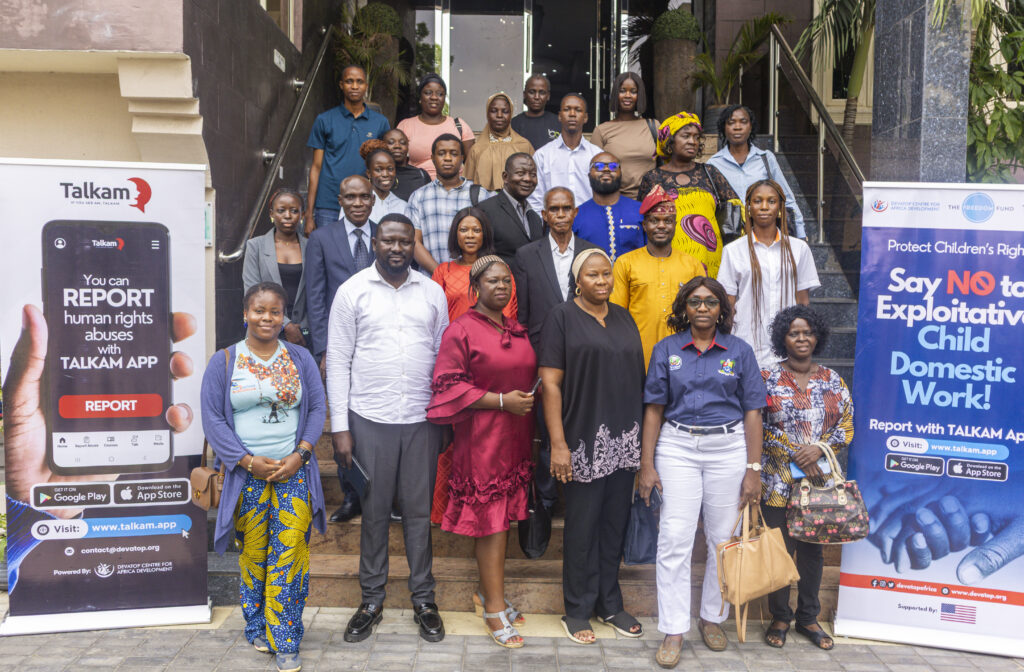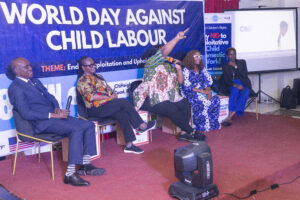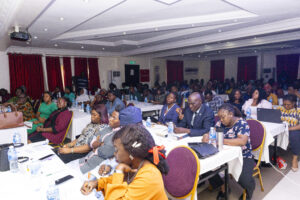DEVATOP Hold High-Level Event in Commemoration of the World Day Against Child Labour

Devatop Centre for Africa Development, with the support of Freedom Fund, recently commemorated the World Day Against Child Labour with a high-impact event that brought together key stakeholders, government representatives, civil society actors, and child protection advocates. The gathering was a call to action to end the exploitation of Child Domestic Workers (CDWs) and to reaffirm the collective responsibility of society to protect children from all forms of abuse.
The event commenced with goodwill messages from Mr. Imeh Samuel, Program Manager at Freedom Fund; Mrs. Comfort Agboko, Lagos Commander of the National Agency for the Prohibition of Trafficking in Persons (NAPTIP); and Elder Akinwunmi Patrick, Deputy Director of the National Human Rights Commission (NHRC). Each speaker highlighted the urgent need for multi-stakeholder collaboration in protecting children and enforcing their rights.
Janet Homo, Project Lead for DEVATOP in Lagos, delivered an insightful overview of the initiative “Protect Child Domestic Workers from Maltreatment.” She provided clear definitions of who qualifies as a child and a child domestic worker, and what constitutes exploitative child domestic work. She emphasized that children are entitled to fundamental rights—life, education, leisure, food, shelter, safety, and family—which are often violated when they are subjected to exploitative domestic labour. Ms. Homo posed a critical question to participants: is protecting child domestic workers solely the government’s responsibility? Hajara Tunde Osho of NAPTIP responded emphatically that everyone has a role to play, from refusing to employ underage domestic workers to reporting abuse and treating every child as one’s own.
The keynote address, delivered by Mrs. Oluyemisi Adefoluke Ogunlola of the Lagos State Law Reform Commission, addressed the theme: “Ending Child Exploitation and Upholding Dignity: A Case Study of Exploitative Child Domestic Work in Lagos State.” Mrs. Ogunlola made a compelling argument that child domestic work, in all its forms, constitutes exploitation because children cannot legally enter into contracts. She classified such work as a form of domestic violence that exposes children to physical, emotional, and sexual harm. She urged stakeholders to focus on the enforcement of existing laws—such as the Lagos State Child Rights Law (2007) and the Domestic Service Providers Law (2019)—and to deepen collaboration rather than call for new legislation. She also highlighted the protective services offered by the Lagos State Domestic and Sexual Violence Agency (DSVA), including shelters and psychosocial support for abused children.
 A robust panel discussion followed, moderated by Mrs. Eduvielawhe Olutimayin, COO of Street Project Foundation, with panelists drawn from the Mirabel Center, Child Protection Network (CPN), the Federal Ministry of Labour and Employment, and the Lagos State Law Reform Commission. Discussions ranged from identifying child domestic workers and distinguishing normal household chores from child labour to understanding the long-term effects of exploitation. Trauma, panelists agreed, is one of the most devastating consequences for children, often requiring years of therapy to overcome.
A robust panel discussion followed, moderated by Mrs. Eduvielawhe Olutimayin, COO of Street Project Foundation, with panelists drawn from the Mirabel Center, Child Protection Network (CPN), the Federal Ministry of Labour and Employment, and the Lagos State Law Reform Commission. Discussions ranged from identifying child domestic workers and distinguishing normal household chores from child labour to understanding the long-term effects of exploitation. Trauma, panelists agreed, is one of the most devastating consequences for children, often requiring years of therapy to overcome.
Throughout the dialogue, collaboration emerged as a recurring theme. Mrs. Mienye Tondo Badejo of the Federal Ministry of Labour and Employment highlighted the necessity of inter-agency and NGO partnerships for effective tracing, case evaluation, and therapy for abused children. Mrs. Aderonke MaryPearl Oyelakin of CPN stressed the importance of accountability, urging stakeholders to familiarize themselves with the Child Rights Law and create awareness within their communities. The panelists’ “one wish” for child domestic workers reflected a shared desire for societal change: a world where every child is seen as part of every adult’s responsibility, where children remain in their primary homes, and where empathy drives collective action.
The interactive session with delegates raised thought-provoking questions about societal attitudes and legal interpretations of child domestic work. Issues such as the exploitation of children taken in by relatives, the role of men in child protection, the influence of religious leaders, and the plight of street children were candidly discussed. Practical solutions were also offered, including the need for emotional and financial readiness for parenting, the benefits of positive discipline over corporal punishment, the promotion of dignity and self-worth in children, and leveraging programs like the Nigeria Education Loan Fund to support indigent families.
A recurring concern was the systemic challenges that hinder effective prosecution of offenders, often due to settlement practices or bureaucratic bottlenecks. Panelists emphasized that sharing cases across agencies and insisting on accountability would reduce these setbacks. The conversation also touched on the unique vulnerabilities of children with disabilities, highlighting that while existing protections apply, additional measures tailored to their specific needs remain necessary.
As the event drew to a close, Mr. Imeh Samuel of Freedom Fund underscored the urgency of creating synergy among stakeholders to address the complex issue of child domestic labour. Bemshima Abako, Head of Business Development at DEVATOP, reiterated the importance of technology-driven interventions, pointing to the TALKAM App, which allows citizens to report cases of abuse from anywhere in the country. Through strategic collaborations, such cases can be referred to the most relevant local authorities or support services.
The commemoration of the World Day Against Child Labour by DEVATOP, supported by Freedom Fund, served as both a powerful reminder and a call to action. Ending the exploitation of child domestic workers demands not only the commitment of government agencies but the collective effort of families, communities, civil society, and every individual who recognizes that protecting children is a shared moral and social responsibility.
